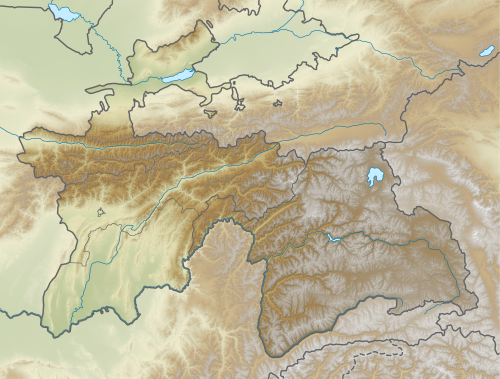Top Qs
Timeline
Chat
Perspective
2006 Tajikistan earthquake
From Wikipedia, the free encyclopedia
Remove ads
On July 29, the 2006 Tajikistan earthquake hit the Khatlon region of Tajikistan.[3] The earthquake doublet killed four people and injured 40 in both Tajikistan and Afghanistan.[4][5]
Remove ads
Damage and casualties
Tajikistan
Three people, all of them children, were killed after walls collapsed on them. Nineteen others were injured, six of them were later evacuated to neighboring district Kolhozabad. At least 1,083 homes were destroyed and 1,500 others were damaged in the worst hit districts of Panj and Qumsangir close to the border with Afghanistan. In addition, nine schools, four health centres and a hospital, four transformers, 2 km (1.2 mi) of electrical lines, a pumping station, a college building, a rest home, four shops and 20 buildings were affected. More than 9,000 people were left homeless.[6][7]
Afghanistan
In Kunduz Province, an elderly woman was killed, 21 others were injured, and more than 50 residential houses were destroyed.[5]
Remove ads
Responses
Summarize
Perspective
Poor water and sanitation posed an ongoing risk to health, as did malaria, given its prevalence in the region and the fact that some people sleep outdoors without mosquito nets. Damaged roofs made from asbestos posed additional risks to health.
Following an initial assessment mission of the earthquake affected areas on 29 July by the Minister for Emergency Situations, a second joint mission followed on 1 August, led by the Deputy Prime Minister and including the UN Country Team, WHO and humanitarian partners. WHO, in collaboration with the Ministry of Health, immediately activated other UN and international agencies and NGOs in response to the disaster.
To date, more than ten health partners, including NGOs, UN and International agencies have worked together to provide 50,000 water purification tablets, 86 tents and essential household items, mosquito nets, soap, buckets and high energy biscuits and to ensure basic drugs and WHO has donated 1 NEHKit to support local health authorities in ensuring essential medications are available for affected communities and forwarded drug donation guidelines.
Funding has been received from ECHO since January 2006, in support of WHO's work to 'strengthen and enhance the coordination of humanitarian health programmes' in Tajikistan.
Remove ads
See also
References
External links
Wikiwand - on
Seamless Wikipedia browsing. On steroids.
Remove ads
